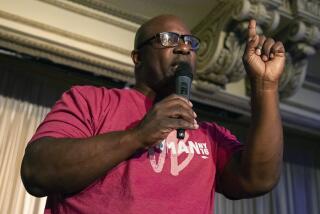Political newbie in Israel wakes up holding the reins

- Share via
JERUSALEM — Just a few days ago, Yair Lapid was a political rookie making his first foray into Israeli elections with a newly formed centrist party. He awoke Wednesday as a major power broker.
Israeli pundits and journalists wasted no time anointing Lapid, 49, a possible heir-apparent to Israeli Prime Minister Benjamin Netanyahu, whose conservative Likud Party delivered a disappointing performance at the polls. Lapid’s new party, Yesh Atid (“There Is a Future”), won 19 seats, nearly overtaking Likud, which came in first with 20.
“New King Is Crowned,” blared one newspaper headline.
Despite Netanyahu’s lackluster showing, he is still considered the front-runner to lead the next government. But it is certain to have a more centrist cast and is likely to pursue a more moderate course at home and abroad. And Lapid is virtually sure to play a key role.
Lapid and other political leaders huddled Wednesday to plan their next moves and prepare for negotiations on forming the next coalition government. With nearly all the votes counted, right-leaning parties that form Netanyahu’s larger constituency were in a dead heat with center-left parties, with both blocs winning 60 seats each. Final tallies are expected to be announced Thursday.
Netanyahu told reporters he hoped to form a broad-based coalition that would focus on Israel’s domestic challenges, including “an equal distribution of social burden, attainable housing and a change in the system of government,” apparently meaning tweaks to the parliamentary system to make it more functional.
Since such topics were scarcely raised by Netanyahu during the campaign, his comments suggested that Lapid, who did focus on them, is already having an effect on domestic policy. It’s less clear how, or whether, Israel’s policies toward the Palestinians and Iran might shift under the next government, although Lapid takes a slightly more moderate approach to both.
He supports a two-state solution to Palestinian relations but opposes evacuating the large West Bank settlement blocks. In theory, these are Netanyahu’s policies as well, but the incumbent has been criticized by some on the left for failing to aggressively pursue peace under a two-state system.
Lapid says he has no illusions about a “happy marriage” with Palestinians; instead, he says, he seeks a “divorce agreement we can live with.”
Palestinians expressed skepticism Wednesday that Lapid’s rise would do much to end settlement construction, which they consider a condition for restarting negotiations.
U.S. officials have taken a wait-and-see approach, saying they hope the next Israeli government will try to negotiate a two-state solution.
Lapid’s potential influence on wider international relations is murkier, but he has spoken out against striking Iran’s purported nuclear program without U.S. support. Netanyahu has said he would consider a unilateral strike.
For many Israelis, there is a sense of deja vu in Lapid’s sudden success.
Lapid, who is married with three children, started as a military magazine correspondent and eventually rose to become one of the country’s most recognized broadcasters. A year ago, he left journalism and announced plans to throw his hat into the political ring, as his father had done before him.
Lapid recalls sitting in his parents’ living room a decade ago when his late father, then-Knesset member Yosef “Tommy” Lapid, heard on TV that his political party had won 15 seats in the 2003 election.
Jubilant family members jumped up and embraced one another, but Yair Lapid, then a journalist, noticed that his somber-faced father remained seated in his armchair, apparently overwhelmed by the sudden sense of responsibility.
“I didn’t understand him at the time,” Lapid told his own cheering supporters Wednesday. “I thought that he could rejoice a little before starting to deal with the weight of the responsibility that fell upon him,” said the former talk show host. “But I understand him tonight.”
Some are wondering whether the photogenic TV personality and author is up to the task.
“His experience begins and ends with presenting television shows and writing scripts and newspaper columns,” Haaretz columnist Yossi Verter wrote Wednesday. “In another month, he’s liable to find himself in the Cabinet room, reading intelligence and defense material that he didn’t even know existed.”
Those who know Lapid warn against underestimating him.
“He’s absolutely ready,” said Dov Lipman, a rabbi who immigrated to Israel from Maryland eight years ago and was elected to the Knesset on Tuesday on the Yesh Atid slate. “He’s a natural leader with a vision and ability to execute.”
Lipman said that while rival candidates bickered and argued during the campaign, Lapid quietly built a grass-roots movement, drawing 15,000 volunteers nationwide. He calls his party “center-center,” to distinguish it from the center-left.
Lapid’s supporters say they don’t expect him to make a power grab or challenge Netanyahu for the prime minister’s job, at least not this time around.
Instead he is calling for a broad coalition of parties to join him in a Netanyahu-led government that will seek to end the polarization of Israeli politics.
Yet Yesh Atid members said Lapid would not shy away from using his newly acquired leverage to pressure the next government to push through his reform program, including implementing a military draft for ultra-Orthodox young people.
Experts attribute Lapid’s surprising success — his party received twice as many Knesset seats as most polls had predicted — to his focus on secular middle-class taxpayers, who are struggling to cope with the rising cost of living and are increasingly resentful of ultra-Orthodox families who rely on government welfare and refuse to serve in the military.
At the same time, the Tel Aviv-born Lapid was careful to distance himself from what many viewed as his father’s anti-religious stance. The No. 2 spot on the son’s slate went to an Orthodox rabbi, and he does not rule out a coalition with a religious party.
With Lapid’s popularity and political lineage, rivals on both the right and left grew anxious when he entered the political ring, trying to pass him off as a coiffed TV hunk with a light resume. “Prom king politician,” critics sneered.
Some lawmakers even tried to pass a rule, dubbed the “Yair Lapid law,” to require a waiting period for journalists seeking to enter politics.
But as the campaign unfolded, attention shifted away from Lapid. In the final days, most eyes were instead on fellow newcomer Naftali Bennett, running for the first time on the far-right Jewish Home slate. It was Bennett who was supposed to be the night’s breakout star, but his party’s modest success was eclipsed by Lapid.
One of Lapid’s neighbors, Nitzan Peleg, praised his stamina and drive. “If his performance in the government is anything like his performance at the gym,” Peleg told Channel 10, “Israel will be in good shape.”
More to Read
Sign up for Essential California
The most important California stories and recommendations in your inbox every morning.
You may occasionally receive promotional content from the Los Angeles Times.










